air conditioning CITROEN DS3 CABRIO DAG 2015 Handbook (in English)
[x] Cancel search | Manufacturer: CITROEN, Model Year: 2015, Model line: DS3 CABRIO DAG, Model: CITROEN DS3 CABRIO DAG 2015Pages: 404, PDF Size: 13.93 MB
Page 12 of 404
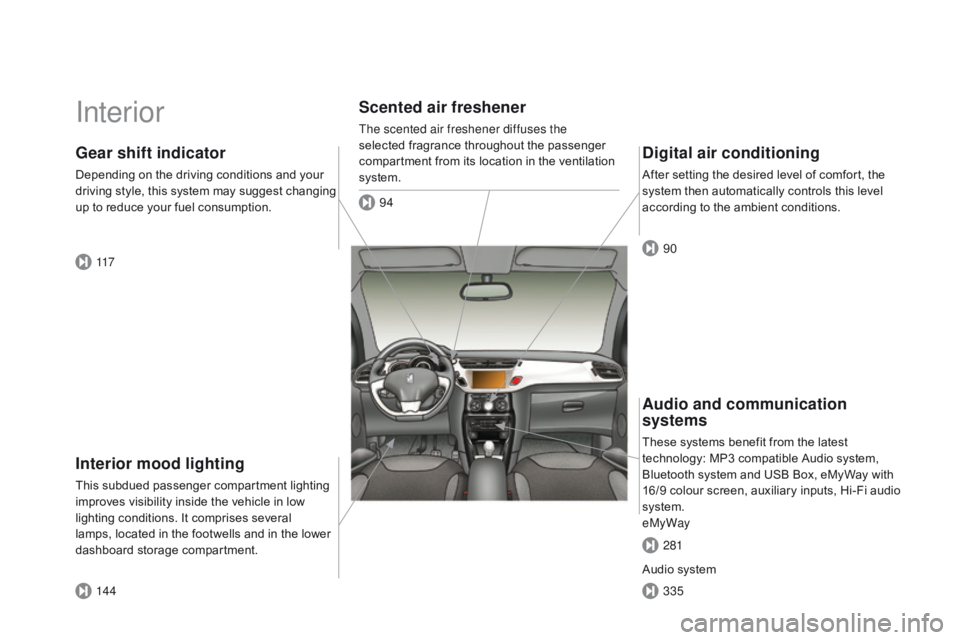
DS3_en_Chap00b_vue-ensemble_ed01-2014
Interior
Interior mood lighting
Thisô subduedô passengerô compartmentô lightingô improves ô visibility ô inside ô the ô vehicle ô in ô low ô
l
ighting ô conditions. ô It ô comprises ô several ô
l
amps, ô located ô in ô the ô footwells ô and ô in ô the ô lower ô
d
ashboard
ô s
torage
ô c
ompartment.
Gear shift indicator
Dependingô onô theô drivingô conditionsô andô yourô driving ô s tyle, ô t his ô s ystem ô m ay ô s uggest ô c hanging ô
u
p ô to ô reduce ô your ô fuel ô consumption.
Scented air freshener
The scented air freshener diffuses the
selectedô fragrance ô throughout ô the ô passenger ô
c
ompartment ô from ô its ô location ô in ô the ô ventilation ô
s
ystem.
digital air conditioning
Afterô settingô theô desiredô levelô ofô comfort,ô theô system ô then ô automatically ô controls ô this ô level ô
a
ccording ô to ô the ô ambient ô conditions.
14 4 117 94
90
335 281
Audio and communication
systems
Theseô systemsô benefitô fromô theô latestô technology: ô MP3 ô compatible ô Audio ô system, ô
B
luetooth ô system ô and ô USB ô Box, ô eMyWay ô with ô
1
6/9 ô colour ô screen, ô auxiliary ô inputs, ô Hi-Fi ô audio ô
s
ystem.
eMyWay
Audio
ô system
Page 14 of 404

DS3_en_Chap00b_vue-ensemble_ed01-2014
Instrumentsô andô controls
1.ô Steeringô lock ô and ô ignition.
2.ô A udio ô equipment ô steering ô wheel ô controls.
3.
ô W
iper ô / ô screenwash ô / ô trip ô computer ô stalk.
4.
ô S
cented ô air ô freshener.
5.
ô C
entral ô locking ô switch.
6.
ô M
ultifunction
ô s
creen.
7.
ô H
azard ô warning ô lamp ô switch.
8.
ô C
entral ô adjustable ô air ô vents.
9.
S
unshine sensor
ô H
i-Fi ô audio ô system ô central ô speaker.
10.
ô P
assenger's
ô ai
rbag.
11.
ô S
ide ô adjustable ô air ô vent.
12 .
ô G
love ô box ô / ô Passenger's ô airbag ô
d
eactivation.
13.
ô P
arking ô brake.
14 .
ô C
entral ô armrest ô with ô storage.
15.
ô U
pper ô and ô lower ô storage.
16.
ô A
udio ô system ô or ô eMyWay.
17.
ô H
eating ô / ô air ô conditioning ô controls.
Page 16 of 404
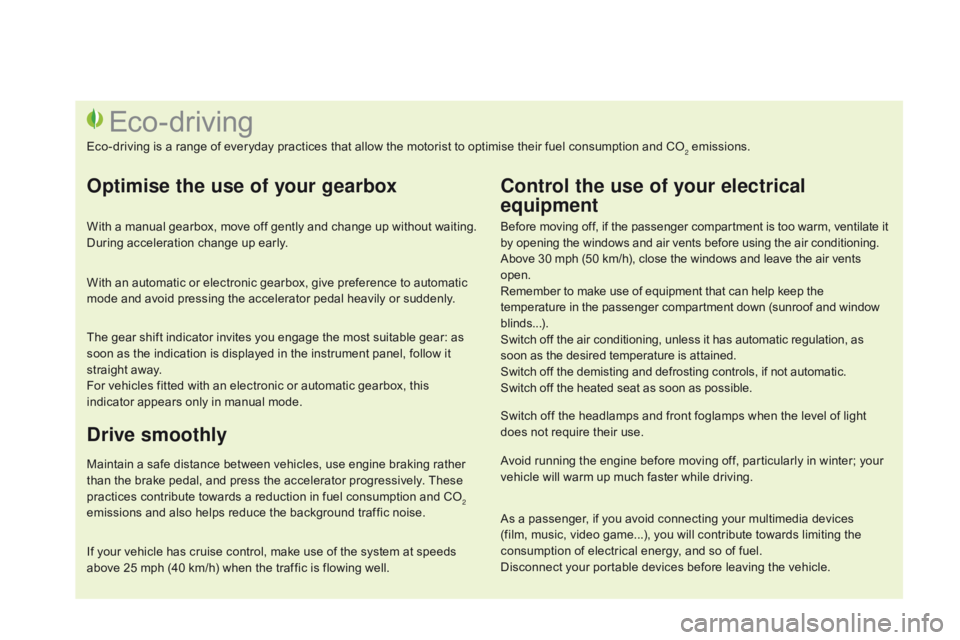
DS3_en_Chap00c_eco-conduite_ed01-2014
Beforeô movingô off,ô ifô theô passengerô compartmentô isô tooô warm,ô ventilateô itô by ô opening ô the ô windows ô and ô air ô vents ô before ô using ô the ô air ô conditioning.
Above
ô 30 ô mph ô (50 ô km/h), ô close ô the ô windows ô and ô leave ô the ô air ô vents
ô ope
n.
Remember
ô to ô make ô use ô of ô equipment ô that ô can ô help ô keep ô the
ô t
emperature ô in ô the ô passenger ô compartment ô down ô (sunroof ô and ô window
ô b
linds...).
Switch
ô off ô the ô air ô conditioning, ô unless ô it ô has ô automatic ô regulation, ô as
ô s
oon ô as ô the ô desired ô temperature ô is ô attained.
Switch
ô off ô the ô demisting ô and ô defrosting ô controls, ô if ô not ô automatic.
Switch
ô off ô the ô heated ô seat ô as ô soon ô as ô possible.
Switch
ô off ô the ô headlamps ô and ô front ô foglamps ô when ô the ô level ô of ô light ô
d
oes ô not ô require ô their ô use.
Avoid
ô running ô the ô engine ô before ô moving ô off, ô particularly ô in ô winter; ô your ô
v
ehicle ô will ô warm ô up ô much ô faster ô while ô driving.
Eco-driving
Eco-drivingô isô aô rangeô ofô everydayô practicesô thatô allowô theô motoristô toô optimiseô theirô fuelô consumptionô andô CO2ô emissions.
Optimise the use of your gearbox
Withô aô manualô gearbox,ô moveô offô gentlyô andô changeô upô withoutô waiting.ô During ô acceleration ô change ô up ô early.
With
ô an ô automatic ô or ô electronic ô gearbox, ô give ô preference ô to ô automatic ô
m
ode ô and ô avoid ô pressing ô the ô accelerator ô pedal ô heavily ô or ô suddenly.
The
ô gear ô shift ô indicator ô invites ô you ô engage ô the ô most ô suitable ô gear: ô as ô
s
oon ô as ô the ô indication ô is ô displayed ô in ô the ô instrument ô panel, ô follow ô it ô
s
traight ô away.
For
ô vehicles ô fitted ô with ô an ô electronic ô or ô automatic ô gearbox, ô this ô
i
ndicator ô appears ô only ô in ô manual ô mode.
drive smoothly
Maintainô aô safeô distanceô betweenô vehicles,ô useô engineô brakingô ratherô than ô the ô brake ô pedal, ô and ô press ô the ô accelerator ô progressively. ô These ô
p
ractices ô contribute ô towards ô a ô reduction ô in ô fuel ô consumption ô and ô CO
2
emissions
ô
and
ô
also
ô
helps
ô
reduce
ô
the
ô
background
ô
traffic
ô
noise.
control the use of your electrical
equipment
Ifô yourô vehicleô hasô cruiseô control,ô makeô useô ofô theô systemô atô speedsô a bove ô 25 ô mph ô (40 ô km/h) ô when ô the ô traffic ô is ô flowing ô well.As
ô a ô passenger, ô if ô you ô avoid ô connecting ô your ô multimedia ô devices ô
(
film, ô music, ô video ô game...), ô you ô will ô contribute ô towards ô limiting ô the ô c
onsumption ô of ô electrical ô energy, ô and ô so ô of ô fuel.
Disconnect ô your ô portable ô devices ô before ô leaving ô the ô vehicle.
Page 74 of 404
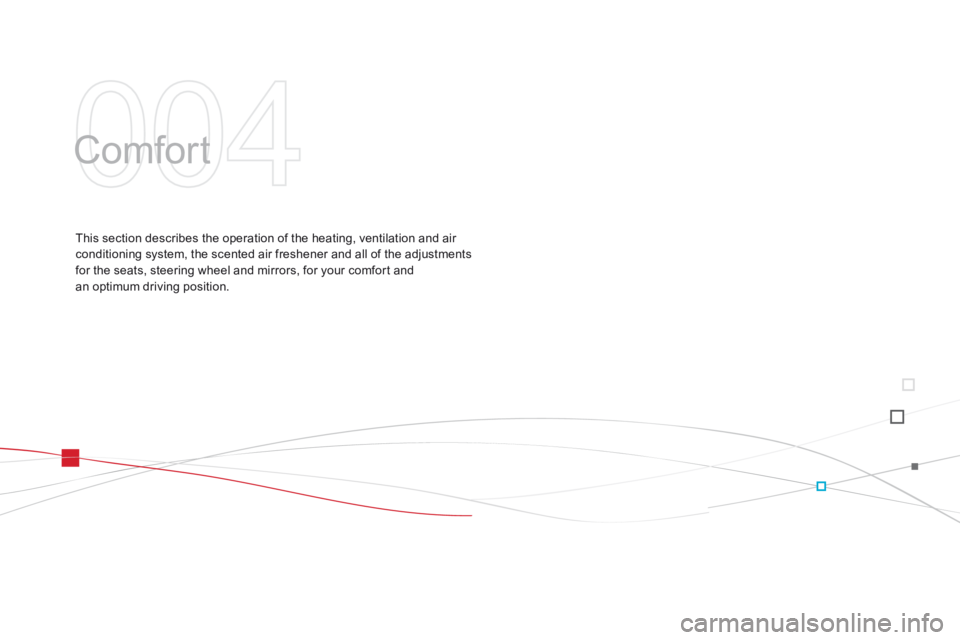
DS3_en_Chap04_confort_ed01-2014
Comfort
Thisô sectionô describesô theô operationô ofô theô heating,ô ventilationô andô airô conditioning ô system, ô the ô scented ô air ô freshener ô and ô all ô of ô the ô adjustments ô
f
or ô the ô seats, ô steering ô wheel ô and ô mirrors, ô for ô your ô comfort ô and ô
a
n ô optimum ô driving ô position.
Page 85 of 404
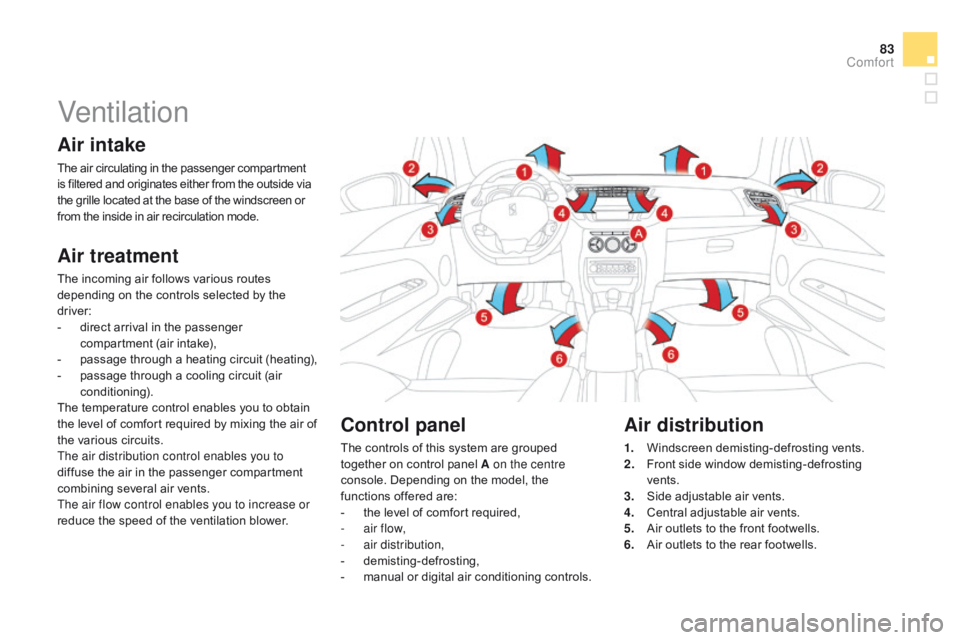
83
DS3_en_Chap04_confort_ed01-2014
Ventilation
Air intake
Theô airô circulatingô inô theô passengerô compartmentô is ô filtered ô and ô originates ô either ô from ô the ô outside ô viaô t
he ô grille ô located ô at ô the ô base ô of ô the ô windscreen ô or
ô f
rom ô the ô inside ô in ô air ô recirculation ô mode.
Air treatment
Theô incomingô airô followsô variousô routesô depending ô on ô the ô controls ô selected ô by ô the ô
d
river:
-
ô
d
irect ô arrival ô in ô the ô passenger ô
c
ompartment ô (air ô intake),
-
ô
p
assage ô through ô a ô heating ô circuit ô (heating),
-
ô
p
assage ô through ô a ô cooling ô circuit ô (air ô
c
onditioning).
The
ô temperature ô control ô enables ô you ô to ô obtain ô
t
he ô level ô of ô comfort ô required ô by ô mixing ô the ô air ô of ô
t
he ô various ô circuits.
The air distribution control enables you to
diffuse
ô the ô air ô in ô the ô passenger ô compartment ô
c
ombining ô several ô air ô vents.
The air flow control enables you to increase or
reduce
ô the ô speed ô of ô the ô ventilation ô blower.
control panel
Theô controlsô ofô thisô systemô areô groupedô together ô on ô control ô panel ô A on the centre
console.
ô Depending ô on ô the ô model, ô the ô
f
unctions ô offered ô are:
-
ô
t
he ô level ô of ô comfort ô required,
-
a
ir flow,
-
a
ir distribution,
-
ô d
emisting-defrosting,
-
ô
m
anual ô or ô digital ô air ô conditioning ô controls.
Air distribution
1.ô Windscreenô demisting-defrostingô v ents.
2.ô F ront ô side ô window ô demisting-defrosting ô
ve
nts.
3.
ô S
ide ô adjustable ô air ô vents.
4.
ô C
entral ô adjustable ô air ô vents.
5.
ô A
ir ô outlets ô to ô the ô front ô footwells.
6.
ô A
ir ô outlets ô to ô the ô rear ô footwells.
comfort
Page 86 of 404
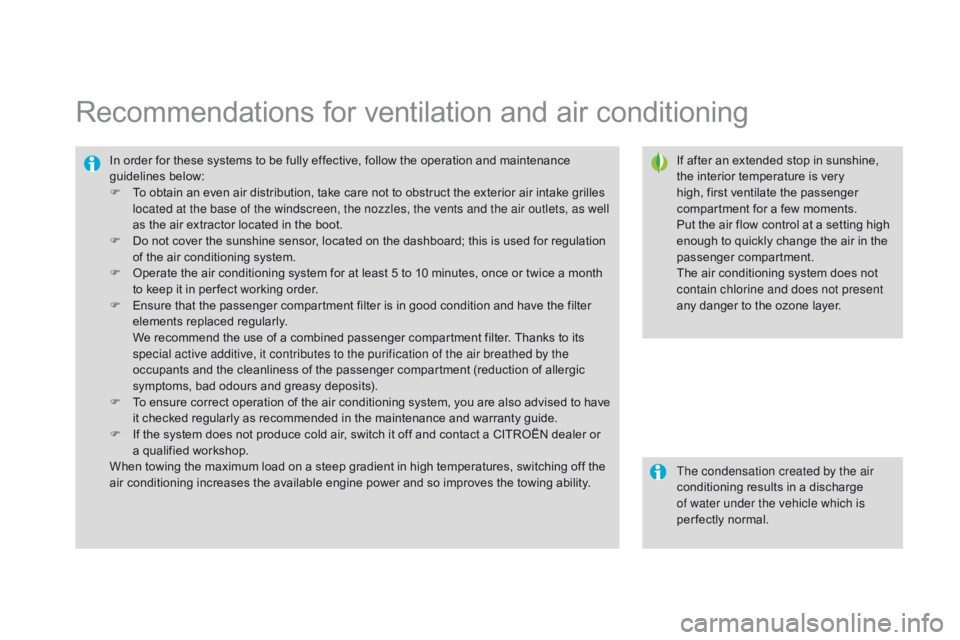
DS3_en_Chap04_confort_ed01-2014
Recommendationsô forô ventilationô andô airô conditioning
Ifô afterô anô extendedô stopô inô sunshine,ô the ô interior ô temperature ô is ô very ô
h
igh, ô first ô ventilate ô the ô passenger ô
c
ompartment ô for ô a ô few ô moments.
Put
ô the ô air ô flow ô control ô at ô a ô setting ô high ô
e
nough ô to ô quickly ô change ô the ô air ô in ô the ô
p
assenger
ô c
ompartment.
The
ô air ô conditioning ô system ô does ô not ô
c
ontain chlorine and does not present
any
ô danger ô to ô the ô ozone ô layer.
In
ô
order
ô
for
ô
these
ô
systems
ô
to
ô
be
ô
fully
ô
effective,
ô
follow
ô
the
ô
operation
ô
and
ô
maintenance
ô g
uidelinesô belo
w:
F
ô
T
o
ô
obtain
ô
an
ô
even
ô
air
ô
distribution,
ô
take
ô
care
ô
not
ô
to
ô
obstruct
ô
the
ô
exterior
ô
air
ô
intake
ô
grilles
ô
l
ocated at the base of the windscreen, the nozzles, the vents and the air outlets, as well
as
ô
the
ô
air
ô
extractor
ô
located
ô
in
ô
the
ô
boot.
F
ô
D
o
ô
not
ô
cover
ô
the
ô
sunshine
ô
sensor,
ô
located
ô
on
ô
the
ô
dashboard;
ô
this
ô
is
ô
used
ô
for
ô
regulation
ô
o
f
ô
the
ô
air
ô
conditioning
ô
system.
F
ô
O
perate
ô
the
ô
air
ô
conditioning
ô
system
ô
for
ô
at
ô
least
ô
5
ô
to
ô
10
ô
minutes,
ô
once
ô
or
ô
twice
ô
a
ô
month
ô
t
o
ô
keep
ô
it
ô
in
ô
per fect
ô
working
ô
order.
F
ô
E
nsure
ô
that
ô
the
ô
passenger
ô
compartment
ô
filter
ô
is
ô
in
ô
good
ô
condition
ô
and
ô
have
ô
the
ô
filter
ô
e
lements
ô
replaced
ô
regularly.
ô W
e
ô
recommend
ô
the
ô
use
ô
of
ô
a
ô
combined
ô
passenger
ô
compartment
ô
filter.
ô
Thanks
ô
to
ô
its
ô
s
pecial active additive, it contributes to the purification of the air breathed by the
occupants
ô
and
ô
the
ô
cleanliness
ô
of
ô
the
ô
passenger
ô
compartment
ô
(reduction
ô
of
ô
allergic
ô
s
ymptoms,
ô
bad
ô
odours
ô
and
ô
greasy
ô
deposits).
F
ô
T
o
ô
ensure
ô
correct
ô
operation
ô
of
ô
the
ô
air
ô
conditioning
ô
system,
ô
you
ô
are
ô
also
ô
advised
ô
to
ô
have
ô
i
t
ô
checked
ô
regularly
ô
as
ô
recommended
ô
in
ô
the
ô
maintenance
ô
and
ô
warranty
ô
guide.
F
ô
I
f
ô
the
ô
system
ô
does
ô
not
ô
produce
ô
cold
ô
air,
ô
switch
ô
it
ô
off
ô
and
ô
contact
ô
a
ô
CITROûN
ô
dealer
ô
or
ô
a
ô
qualified
ô
workshop.
When
ô
towing
ô
the
ô
maximum
ô
load
ô
on
ô
a
ô
steep
ô
gradient
ô
in
ô
high
ô
temperatures,
ô
switching
ô
off
ô
the
ô
a
ir
ô
conditioning
ô
increases
ô
the
ô
available
ô
engine
ô
power
ô
and
ô
so
ô
improves
ô
the
ô
towing
ô
ability. The condensation created by the air
conditioning
ô results ô in ô a ô discharge ô
o
f water under the vehicle which is
per fectly
ô normal.
Page 88 of 404

DS3_en_Chap04_confort_ed01-2014
Manualô airô conditioning
Manual control panel Electric control panel
Page 89 of 404

87
DS3_en_Chap04_confort_ed01-2014
Theô heatingô /ô ventilationô orô airô conditioningô systemsô operatesô withô theô engineô running,ô asô wellô asô inô STOPô modeô withô Stopô &ô Start.
1. Temperature adjustment
Fô Turnô the ô dial ô from ô blue ô (
cold) ô to ô red ô (hot) ô to ô adjust ô
t
he ô temperature ô to ô your ô
r
equirements.
2. Air flow adjustment
Fô Turn ô the ô dial ô from ô position ô 1
to position 5 to obtain a
comfortable
ô air ô flow.
F
I
f you place the air flow control
in position 0 (deactivation of the
system),
ô the ô temperature ô is ô no ô
l
onger ô maintained ô at ô a ô comfortable ô
l
evel. ô However, ô a ô slight ô flow ô of ô air, ô
d
ue ô
t
o ô
t
he ô
m
ovement ô
o
f ô
t
he ô
v
ehicle, ô
c
an ô still ô be ô felt.
3. Air distribution adjustment
Windscreenô andô sideô windows.
W indscreen, side windows and
footwells.
Footwells.
Central
ô and ô side ô vents.
The air distribution can be
adapted
ô by ô placing ô the ô dial ô
i
n ô an ô intermediate ô position.
4. Air intake / Air recirculation
Theô intakeô ofô exteriorô airô avoidsô theô formationô of ô mist ô on ô the ô windscreen ô and ô side ô windows.
The recirculation of interior air insulates the
passenger
ô compartment ô from ô exterior ô odours ô
a
nd ô smoke.
Return
ô to ô exterior ô air ô intake ô as ô soon ô as ô possible ô
t
o prevent deterioration of the air quality and
the
ô formation ô of ô mist.
Manual control panel F
ô
M
ove ô the ô manual ô control ô to ô
t
he ô left ô to ô be ô in ô the ô "recycling ô
i
nterior ô air" ô position.
F
ô
M
ove ô the ô manual ô control ô to ô the ô
r
ight ô to ô return ô to ô the ô "fresh ô air ô
i
ntake" ô position.
comfort
Page 90 of 404

DS3_en_Chap04_confort_ed01-2014
5. Air conditioning On / Off
Theô airô conditioningô isô designedô toô operate effectively in all seasons,
with
ô the ô windows ô closed.
Electric control panel
F
P
ress the button to recirculate
the
ô
interior
ô
air.
ô
The
ô
indicator
ô
l
amp
ô
comes
ô
on
ô
to
ô
confirm
ô
this.
F
ô
P
ress
ô
the
ô
button
ô
again
ô
to
ô
allow
ô
fresh
ô
air
ô
i
nto
ô
the
ô
passenger
ô
compartment.
ô
The
ô
i
ndicator
ô
lamp
ô
goes
ô
off
ô
to
ô
confirm
ô
this. It
ô
enables
ô
you ô to:
-
ô
l
ower
ô
the ô temperature, ô in ô summer,
-
ô
i
ncrease ô the ô effectiveness ô of ô the ô demisting ô
i
n
ô
winter, ô above ô 3 ô ô¯C.Switching on
F Press the "A /c" b utton, the button's
indicator ô lamp ô comes ô on.
Switching off
F Press the "A /c"ô button ô again, ô the ô button's ô i
ndicator ô lamp ô goes ô off.
Switching
ô off ô may ô affect ô comfort ô levels ô
(
humidity,
ô c
ondensation).
The
ô air ô conditioning ô does ô not ô operate ô
w
hen ô the ô air ô flow ô adjustment ô control ô 2
is in position " 0".
To ô obtain ô cooled ô air ô more ô quickly, ô you ô
c
an use recirculation of interior air for
a ô few ô moments. ô Then ô return ô to ô fresh ô
a
ir ô intake.
Page 91 of 404

89
DS3_en_Chap04_confort_ed01-2014
Frontô demistô -ô defrost
With the heating /
ventilation system
Fô Putô the ô temperature ô and ô air ô flow ô controls ô to ô t
he ô dedicated ô marked ô position.
F
ô
P
ut ô the ô air ô intake ô control ô to ô the ô "Exterior ô air ô
i
ntake" ô position ô
ô
(
manual ô control ô to ô the ô right ô or ô electric ô
c
ontrol ô with ô indicator ô lamp ô off).
F
P
ut the air distribution control to the
"Windscreen"
ô p
osition.
These
ô markings ô on ô the ô control ô panel ô indicate ô the ô control ô positions ô for ô rapid ô demisting ô or ô defrosting ô of ô the ô windscreen ô and ô side ô windows.
With the manual air
conditioning system
Fô Put
ô the ô temperature ô and ô air ô flow ô controls ô to ô t
he ô dedicated ô marked ô position.
F
ô
P
ut ô the ô air ô intake ô control ô to ô the ô "Exterior ô air ô
i
ntake" ô position ô
ô
(
manual ô control ô to ô the ô right ô or ô electric ô
c
ontrol ô with ô indicator ô lamp ô off).
F
P
ut the air distribution control to the
"Windscreen"
ô p
osition.
F
ô
S
witch ô on ô the ô air ô conditioning ô by ô pressing ô
t
he "A /
c"ô
button; ô the ô associated ô green ô
w
arning ô lamp ô comes ô on. With
ô Stop ô & ô Start, ô when ô the ô demisting, ô
a
ir ô conditioning ô and ô air ô flow ô functions ô a
re ô activated, ô STOP ô mode ô is ô not ô a
vailable.
comfort